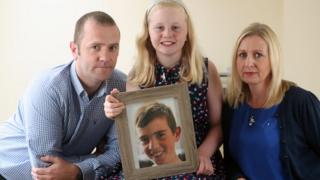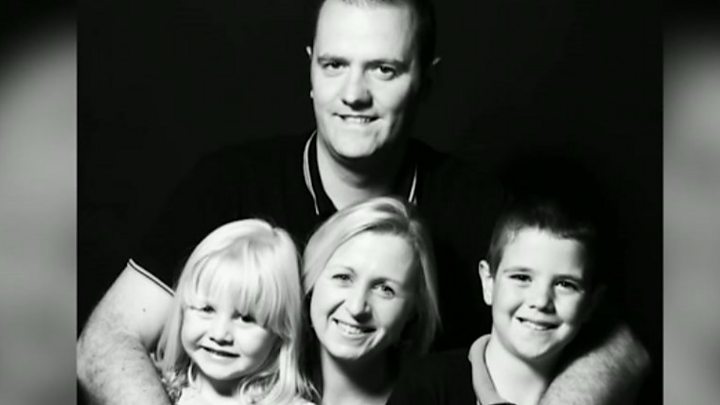
Image copyright
Diabetes UK Cymru
The Baldwin family have campaigned for change in Peter’s memory
Routine screening for type 1 diabetes in children and young people should be introduced to put a stop to preventable deaths, a report says.
Early identification is key to tackling the sometimes fatal condition, a Welsh assembly committee said.
It follows a petition by a family calling on the Welsh Government to introduce the measure after their son died aged 13.
Peter Baldwin died in 2015 after his GP failed to diagnose the illness.

His mother, Beth Baldwin, from Cardiff, said the recommendation made “exceeded all expectations”, adding she was “overwhelmed” by the depth of the measures put forward.
The committee said questions about the “4 Ts” symptoms – Toilet, Thirsty, Tired and Thinner – should be routinely asked when unwell children and young people see a GP or other health professional.
In addition it wants appropriate diagnostic testing, for example through the use of finger prick blood glucose testing, to be carried out immediately when symptoms which could be indicative of type 1 diabetes are present.
People with type 1 diabetes cannot produce the hormone insulin, which controls the amount of glucose in the blood.
It is an unpreventable, lifelong condition and the cause is unknown but can be managed if diagnosed in time. It usually affects children or young adults, with symptoms starting suddenly and progressing quickly.
About one in five of children are not diagnosed until they are in diabetic ketoacidosis (DKA), the life-threatening state Peter Baldwin entered.
Diagnosed with a chest infection by his GP, he became ill the following day and was rushed to hospital. The paramedic who attended carried out a finger prick test and diagnosed type 1 on the spot, but Peter was already too ill and died soon after.
Learn more about Peter:
- Peter could have been saved by a simple test
- ‘My child shouldn’t have died’
- Family to raise deadly diabetes profile
There are about 1,400 children with diabetes in Wales, the vast majority of which (96%) have Type 1 diabetes, according to Diabetes UK Cymru.
But more needs to be done to improve awareness and recognition of the illness among the public and healthcare professionals, the committee said.
Image copyright
Beth Baldwin
Peter Baldwin had fallen ill but his GP failed to diagnose him with type 1 diabetes
“It goes without saying that the loss of a child is, thankfully, largely unimaginable for most people and the tremendous courage of Peter’s family in seeking to use such awful circumstances to prevent the same situation happening to others should command enormous respect,” said David Rowlands AM, chairman of the petitions committee.
“They’ve really listened to us,” Mrs Baldwin said. “Wales really can lead the way on this.”
The report and its recommendations will now be considered by the Welsh Government with a debate to be held during plenary in the autumn.
“A number of the committee’s recommendations are already being actioned as part of our Diabetes Delivery Plan,” a Welsh Government spokeman said.
“The plan is clear that all type 1 diabetes requires prompt diagnosis and treatment and recognises this is imperative for children. We will consider the report’s findings,”



